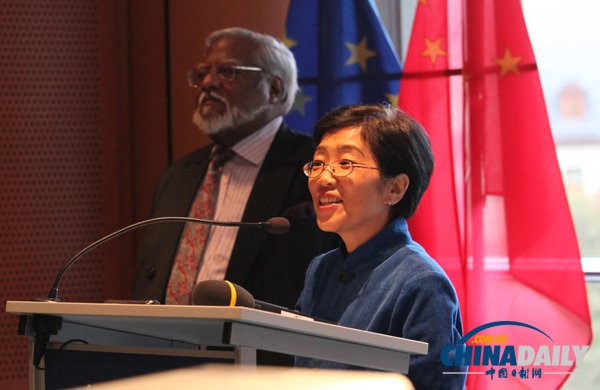 |
|
Yang Yanyi, Head of the Chinese Mission to the EU is seen in this file photo taken in October of 2014. [Photo by Fu Jing/chinadaily.com.cn] |
The recent weeks have seen further worrying moves in Brussels. The European Commission opened new anti-dumping investigations on steel products originating from China, and the European steel industry organized a demonstration against so-called Chinese dumping on the EU market and the granting of Market Economy Status for China.
The message carried – the protectionist sentiment is worrying and the confrontational approach is regrettableand misleading.
No body should be under any illusion: overcapacity, including excessive capacity of the global steel sector is one of the many challenges we are all faced with. Not only European steel industry sector has been hard hit, iron and steel industries in China and many other emerging economies are bearing the brunt, suffering badly from excessive production and flagging demand.
According to some estimates, a reduction of overcapacity cut back by 30% in those industries with most excess capacity—iron and steel, coal, cement, ship building, aluminum and flat glass is expected to affect employment of three million workers.
Not to mention that China is also confronted with many other daunting tasks: lifting out of poverty the remaining 70 million people, advancing industrialization to transform China into a post-industrial society, rebalancing the economy from investment and net exports to consumption and innovation.
The situation is serious and requires a response.
But what kind of response? Grumble, curse, cut the ground from under other's feet, retreat into protectionism and to be at each other's throats?
If history serves as a guide, these are unwelcome if not irresponsible responses. They may help to give vent to one's anger and frustration and obtain short-term gains, but fail to serve one's long-term self-interest and common interest of all.
Obviously how to respond to challenges belongs to the competence of each and every country. I only wish to share what we believe to be the best possible approachand option and what China has been doing and will continue to do with regard to the issue on hand.
First, digest the problem and not dump it onto other'sdoorsteps.
Development of the steel industry in China is mainly to meet its domestic demand, rather than to export to other countries.
To effectively deal with the overcapacity problems, China has taken tough measures to control new capacity.Painful as it is, China has cut its steel industry capacity by more than 90 million tons over the past few years and investment in iron and steel assets by 13% last year andthe growth of Chinese steel production has basically come to a halt.